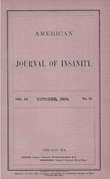Abstract
We are able to say, with comnplete confidence and earnest sincerity, that the legal test for the irresponsibility of the insane is wrong in theory, false in fact, cruel in its metaphysical conception, and unreliable in its practical application. If, however, the law, admitting its errors, asks medical men to supply sonic new test of irresponsibility capable of general application, it is asking an impossibility. Insanity is not a result of metaphysical definition; it is a matter of physical brain disease. There is no single test of insanity; there caii be no single test for the irresponsibility of the insane. Some insane are responsible for certain, if not all of their criminal acts; others are completely irresponsible, and there are gradations of responsibility varying with the nature of the act and the state of the insane person. Every case must be considered by its own facts. As well might a medical man ask the law to lay down the test for typhoid fever when an area is declared infected and when all cases occuring therein must be reported under penalty of a fine.
"The falseness of the legal position," says Maudsley, "will appear at once if we suppose a case of poisoning instead of a case of mental derangement. What would be thought of a judge who, when medical evidence of poisoning was given, should instruct the jury as a principle of law that they must be governed in their verdict by the presence or absence of a particular symptom.
If the tests of insanity are matters of law the practice of allowing experts to testify what they are should be discontinued; if they are matters of fact the judge should no longer testify without being sworn as a witness, and showing himself qualified to testify as an expert."
Judge Doe, State of New Hampshire vs. Pike.
"But, in truth, the tests of insanity are no more matters of law than are the tests of a poison or the symptoms of a disease.
If a jury were instructed that certain manifestations were symptoms or tests of consumption, cholera, congestion or poison, a verdict rendered in accordance with such instructions would be set aside, not because they were be determined by the jury upon evidence."
Boardman vs. Woodman, State of New Hampshire.
Dispassionate thought must convince anyone that there can be no single test for the irresponsibility of the insance. The absence of a knowledge of right and wrong, the inability to control one's impulses, the want of design in planning some act, the lack of cunning in escaping from justice, the failure to recognize acquaintances, the unfitness to transact business—not one of these is a sure test. All tests of insanity and of irresponsibility there-from are purely matters of fact which should in each case be determined by the jury, and not laid down by the Court.

